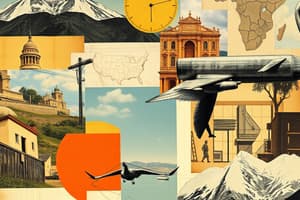Podcast
Questions and Answers
Qu'est-ce que l'interviewé pense des régions administratives par rapport aux identités culturelles?
Qu'est-ce que l'interviewé pense des régions administratives par rapport aux identités culturelles?
- Les régions ne sont pas importantes pour la préservation des identités culturelles.
- Les régions sont les porteurs des valeurs culturelles et identitaires.
- Les régions peuvent être considérées comme des entités culturelles et administratives.
- Les régions ne sont que des entités administratives et politiques. (correct)
Quel est le pourcentage de Français qui vivent dans le département où ils sont nés?
Quel est le pourcentage de Français qui vivent dans le département où ils sont nés?
- 50% (correct)
- 10%
- 75%
- 25%
Quel est le point de vue de l'interviewé sur les cultures locales?
Quel est le point de vue de l'interviewé sur les cultures locales?
- Les cultures locales devraient rester ouvertes et ne pas devenir exclusives. (correct)
- Les cultures locales ne sont pas importantes pour la richesse culturelle
- Les cultures locales ne devraient pas être mélangées avec les cultures immigrantes.
- Les cultures locales devraient être exclusives et fermées.
Flashcards are hidden until you start studying
Study Notes
- The interviewer asks about the defense of regional languages and identities.
- The interviewee argues that regions are administrative and political entities, not necessarily carriers of cultural or identity values.
- There are many territories with identities, including small ones, and these should not be mixed up with administrative regions.
- Regions need to articulate the identities of cultural entities and immigrant populations.
- 50% of French people live in the department where they were born, so not all belong to local cultures.
- Local cultures should remain open and not become exclusive.
- Cultural heritage is complex and a source of richness.
- There are political and administrative territories.
- There is no reason for cultural and administrative regions to overlap.
- The interviewee advocates for careful consideration of the role of regional identities in the context of administrative entities.
Studying That Suits You
Use AI to generate personalized quizzes and flashcards to suit your learning preferences.




